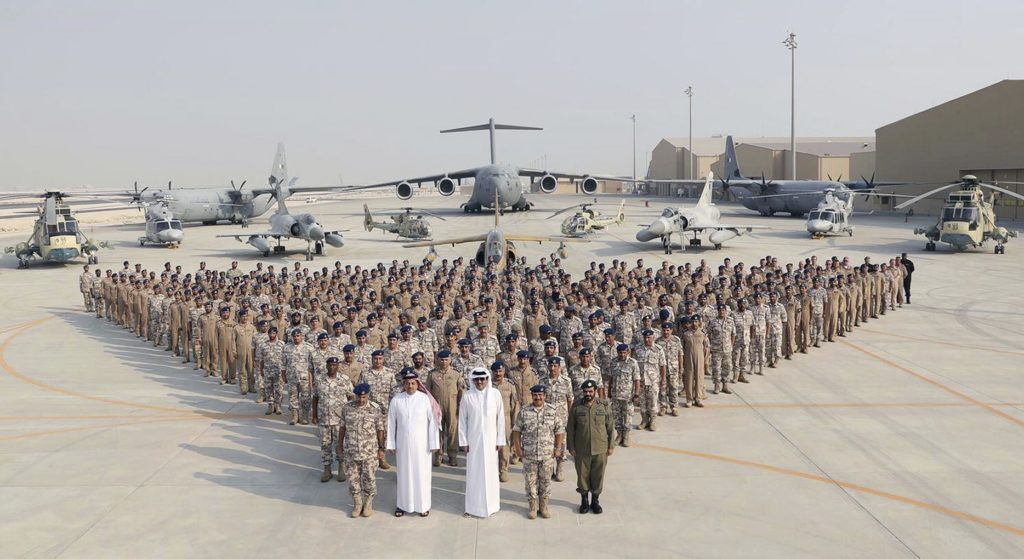Qatar is Helping Iran. Trump Has the Leverage to Force a Change — But Will He?

Qatar News Agency / via AP file
Less than 48 hours after three commercial jets hit the World Trade Center and the Pentagon on Sept. 11, 2001, I helped the U.S. Air Force open the Al Udeid Air Base in Qatar as the general in charge of all U.S. Air Force personnel in the Middle East. It was a strategically advantageous site on the Persian Gulf that allowed our planes to get into position for operations in Afghanistan, a crucial mission in defense of our country.
That conflict isn’t over, and the United States’ need for strategic posts in the Middle East is as great as ever, particularly as tensions with Iran mount and the Pentagon dispatches 1,000 more troops to the region. Though that number is down considerably from the 120,000 floated in May, it underscores how seriously the U.S. needs to be able to address threats in the region, particularly those from Iran.
It is time to use the full force of the Oval Office to explain the dire consequences that Qatar could face for continuing its game of cozying up to countries on all sides of the Middle East’s volatile divides.
Yet, it is the very danger posed by Iran that leads me to call for the Al Udeid Air Base to be closed if Qatar doesn’t change its behavior. It has shown support for Iran, which has been the world’s foremost abetter of state-sponsored terrorism and ill-will in the Middle East and the very one we are prepping to combat. In this current climate, where Iran is accused of attacking foreign oil tankers and U.S. drones and has announced it’s accelerating work on its nuclear program, Qatar must choose: It can keep its U.S. air base or its ties to Tehran.
President Donald Trump has the ideal opportunity to convincingly deliver this message when he hosts Qatari Emir Sheikh Tamim bin Hamad Al-Thani on Tuesday. It is time to use the full force of the Oval Office to explain the dire consequences that Qatar could face for continuing its game of cozying up to countries on all sides of the Middle East’s volatile divides; it is time to decide which team it’s on.
I say this as someone who has dedicated his career to serving our armed forces and who believes strongly that the U.S. must maintain a military presence in hot spots throughout the world, build alliances as a bulwark against terrorism, and serve as a global player to stand for good. Including, certainly, in the Gulf.
We should build those alliances, though, only with partners that share our goals and objectives. We must now take the time to reconsider whether Qatar is such a strategic partner.
In addition to its troubling involvement with Iran, Qatar is a nation that has been accused of supporting Khalid Sheikh Mohammed, who was the principal architect behind the Sept. 11 attacks. It is a nation that has funded Muslim Brotherhood affiliates, Hamas, ISIS, Al-Nusra Front (Al-Qaeda in Syria) and the Taliban. Israeli diplomats refer to it as the “Club Med” of the Islamic terror world — a posh breeding ground for terrorism.
In June 2017, Saudi Arabia, Bahrain, the United Arab Emirates and Egypt all cut formal relations with Qatar because they recognized that their Gulf neighbor must make the choice that I am urging the U.S. to make as well. We should be as clear-eyed in our approach to the region.
Until now, U.S. strategy in the Middle East has been uneven and fractionalized. It is time to set priorities and stay the course on those objectives, particularly deterring Iran and its proxies, and contributing to the defense of our regional allies, first and foremost Israel, as well as like-minded nations such as Saudi Arabia, the United Arab Emirates, Bahrain, Kuwait, Jordan and Egypt.
The United States has leverage when it comes to Qatar and the Al Udeid Air Base. Our Air Force has used that base for more than 17 years now. Qatar wants the base to remain, and has offered many inducements for it to stay.
As important as the base clearly is to Qatar, the kingdom doesn’t seem to realize that it’s not critical to America.
As important as the base clearly is to Qatar, the kingdom doesn’t seem to realize that it’s not critical to America. Our military could easily expand to other regional partners such as Saudi Arabia, the UAE or even Jordan. Moving our forces currently based in Qatar is not nearly as difficult as one might think, and can be done relatively quickly and painlessly. We are not, and never will be, dependent on a single base.
Trump must tell the emir: The U.S. will stay and continue to invest in the Al Udeid Air Base if — and only if — you rejoin the Gulf Cooperation Council and cut your ties with Iran. The choice is yours.
Originally Published in NBC News on July 8, 2019.